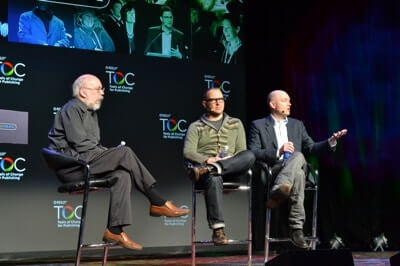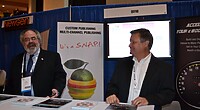
Tim O’Reilly, of course, runs the show and this is the seventh edition of the conference. He started Tools of Change because O’Reilly needed to look to the future. eBooks are multiplying, but even more interesting is the fact that print has not gone away and it looks like the industry is coming to some kind of equilibrium. Importantly, the fear that a new thing is a bad thing is going away, as this fear is almost always misplaced. Most of the industry is wrong about the difficulties of book discovery, as is the fear that if the bookstore goes away discovery will as well. It is encouraging that there are more and more new methods of discovery and people know how to use them People are figuring out the new medium, as is proved by John and Hank Green, who have built a massive online presence around books and YouTube. If you are a publisher and all you think about are books and ebooks, you may be missing something as publishing today encompasses much more than this. This is the reason O’Reilly is involved in so many different types of business. There is no bright line between publishing and the internet any more. The biggest reason to be optimistic is because readers and writers are doing fine. We should be talking about why we are here – it is not to make our fortune. Publishing and writing are all about solving problems. We still have a job to do and that job is to entertain and educate and share knowledge. Books and writing have mattered in the past and they still matter and if you make this the heart of what you do, you will succeed. He says his message is this: work on stuff that matters.
Brian David Johnson, Intel Corporation; He is a “futurist” with Intel whose job is to look 10 to 15 years in the future and model what will happem. Intel needs this because it takes about 5 years to design a chip. Around the year 2020 we will be able to turn anything into a computer because of the decreasing size of chips. But once you can turn anything into a computer the next question is what you should do. He’s a science fiction author and for the last decade has been using science fiction, with good science, to understand what science will be doing to people. Steampunk is interesting because it is all about technology that is playing with the past and this means that steampunk authors want a different future and is fun to speculate on what this could bring about. The way you change the future is to change the story that people tell themselves about what the future will be. For the work we all do as publishers, writers, thinkers and technologists we need to think about how we will change the way that people think about the future and what will happen. The future of publishing sits in the ToC room and the people here are the ones who will make it.
Matt McInnis, of Inkling who recapped the press event we covered earlier.
John Wheeler of SPI Global discussed HTML5 (EPUB), which many people consider the future of publishing. He pointed out that without standards, such as ePub, publishers have to sort out a lot of device specific output formats. It is encouraging that even Kindle, Nook, Sony and Kobo are starting to support ePub3. There is a long ways to go but they are getting there. Embracing it gives the producers the opportunity to simplify their production activities and can result in a simpler and enhanced work flow. Importantly, Epub 3 allows for graceful degradation if a device does not support the standard. It is also good for alternate language support and for accessibility.
The morning keynotes ended with Brian David Johnson and Cory Doctorow, moderated by Henry Jenkins. Cory feels that now you can do a novel with concepts unfamiliar to readers because you can assume that the reader has a search box open and can find out what the unfamiliar concept is about. Good literature in the future will assume that a search engine is available, just like we assume pocket calculators are available to the everyday user. Wide distribution is the next major phase of literature. He says that we need to replace mammalian reproductive strategy with dandelion strategy. A dandelion has thousands of seeds that are scattered indiscriminately over the landscape. It wants a seed in every crack of the pavement Cory feels that book distribution should be the same way. This kind of strategy only works when reproduction cost is zero or extremely cheap. Brian feels that now if you write a book that is too long you can take the material out and make another book – and make it digital. This allows the author to expand on the narrative and is very liberating.
